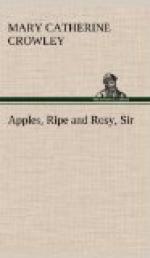Certain it is that Stingy Willis acted upon the principle, “a penny saved is a penny gained,”—denied himself every luxury, and lived with extreme frugality, as the man who kept the meat-market and grocery at the corner frequently testified. Even in the coldest weather, a fire was never kindled in the house till evening; for over its dying embers the solitary man made his coffee the following morning. A basket of coal lasted him a week, and he sifted the cinders as carefully as if he did not know where to find a silver quarter to buy more fuel. He had nothing to do with his neighbors, who really knew very little about him beyond what they could see of his daily life. They were almost all working people, blessed with steady employment; though they had not more than enough of this world’s goods, there was no actual poverty among them. They were respectable, honest, and industrious; as Bernard said, not one of the dwellers in the street would ever be suspected of being “mean enough to steal coal,” unless indeed Stingy Willis.
II.
Gloomy days continued for the Farrells; yet the outside world never dreamed of the straits to which they were reduced, for a spirit of worthy independence and pardonable pride led them to keep their trouble to themselves. Mrs. Farrell would have died, almost, rather than reveal their need to any one; nothing save the cry of her children asking in vain for bread would bring her to it. Well, they still had bread and oatmeal porridge, but that was all.
Who would have imagined it! The little house was still distinguished from the others of the row by an appearance of comfort. Although Mrs. Farrell could not do any type-writing, the children were neat and trim going to school; Bernard’s clothes were as carefully brushed, his boots as shining, linen as fresh, his mien as gentlemanly as ever. And they found great satisfaction in the reflection that no one was aware of the true state of affairs. The mother and Bernard agreed, when they began housekeeping under their changed circumstances, to contract no bills; what they could not afford to pay for at the time they would do without. So now no butcher nor baker came clamoring for settlement of his account. The doctor was willing to wait for his money; all they owed besides was the rent. Only the landlord knew this, and he was disposed to be lenient. Mrs. Farrell still tried to hope for the best, but sometimes she grew dejected, was sorely tempted to repine.
“Mother,” little Jack once asked, “aren’t people who, as you say, ’have seen better days’ and become poor, much poorer than people who have always been poor?”
“It seems to me they are, my child,” answered the widow, dispiritedly. “But why do you think so?”
“Because,” replied the young philosopher, “we are much poorer than the woman who used to wash for us. She appeared to have everything she wanted, but we have hardly anything.”




